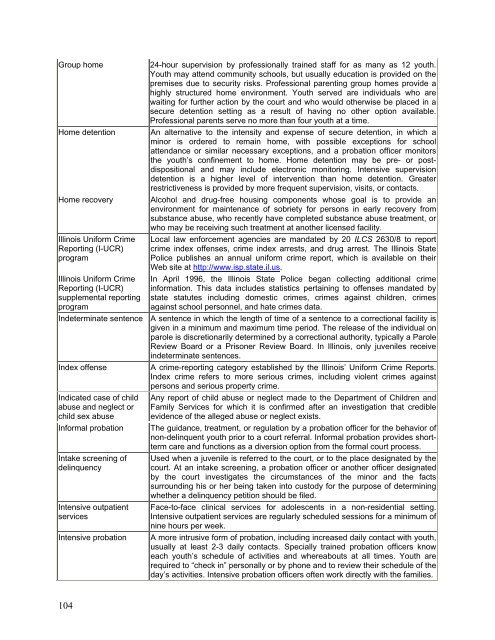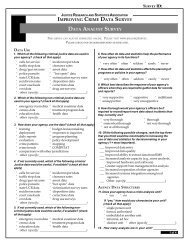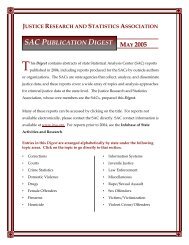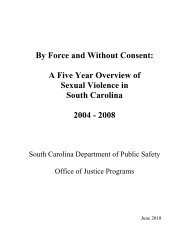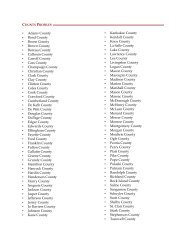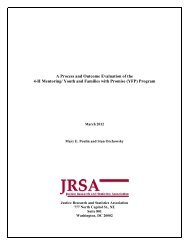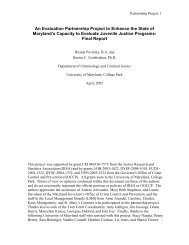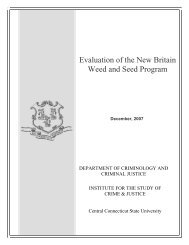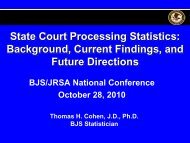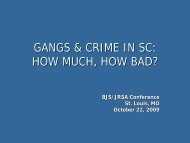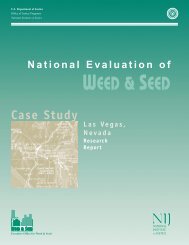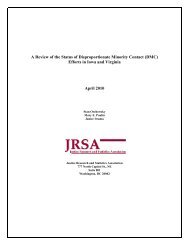Juvenile Justice System and Risk Factor Data - Illinois Criminal ...
Juvenile Justice System and Risk Factor Data - Illinois Criminal ...
Juvenile Justice System and Risk Factor Data - Illinois Criminal ...
You also want an ePaper? Increase the reach of your titles
YUMPU automatically turns print PDFs into web optimized ePapers that Google loves.
Group home<br />
Home detention<br />
Home recovery<br />
<strong>Illinois</strong> Uniform Crime<br />
Reporting (I-UCR)<br />
program<br />
<strong>Illinois</strong> Uniform Crime<br />
Reporting (I-UCR)<br />
supplemental reporting<br />
program<br />
24-hour supervision by professionally trained staff for as many as 12 youth.<br />
Youth may attend community schools, but usually education is provided on the<br />
premises due to security risks. Professional parenting group homes provide a<br />
highly structured home environment. Youth served are individuals who are<br />
waiting for further action by the court <strong>and</strong> who would otherwise be placed in a<br />
secure detention setting as a result of having no other option available.<br />
Professional parents serve no more than four youth at a time.<br />
An alternative to the intensity <strong>and</strong> expense of secure detention, in which a<br />
minor is ordered to remain home, with possible exceptions for school<br />
attendance or similar necessary exceptions, <strong>and</strong> a probation officer monitors<br />
the youth’s confinement to home. Home detention may be pre- or postdispositional<br />
<strong>and</strong> may include electronic monitoring. Intensive supervision<br />
detention is a higher level of intervention than home detention. Greater<br />
restrictiveness is provided by more frequent supervision, visits, or contacts.<br />
Alcohol <strong>and</strong> drug-free housing components whose goal is to provide an<br />
environment for maintenance of sobriety for persons in early recovery from<br />
substance abuse, who recently have completed substance abuse treatment, or<br />
who may be receiving such treatment at another licensed facility.<br />
Local law enforcement agencies are m<strong>and</strong>ated by 20 ILCS 2630/8 to report<br />
crime index offenses, crime index arrests, <strong>and</strong> drug arrest. The <strong>Illinois</strong> State<br />
Police publishes an annual uniform crime report, which is available on their<br />
Web site at http://www.isp.state.il.us.<br />
In April 1996, the <strong>Illinois</strong> State Police began collecting additional crime<br />
information. This data includes statistics pertaining to offenses m<strong>and</strong>ated by<br />
state statutes including domestic crimes, crimes against children, crimes<br />
against school personnel, <strong>and</strong> hate crimes data.<br />
Indeterminate sentence A sentence in which the length of time of a sentence to a correctional facility is<br />
given in a minimum <strong>and</strong> maximum time period. The release of the individual on<br />
parole is discretionarily determined by a correctional authority, typically a Parole<br />
Review Board or a Prisoner Review Board. In <strong>Illinois</strong>, only juveniles receive<br />
indeterminate sentences.<br />
Index offense<br />
A crime-reporting category established by the <strong>Illinois</strong>’ Uniform Crime Reports.<br />
Index crime refers to more serious crimes, including violent crimes against<br />
persons <strong>and</strong> serious property crime.<br />
Indicated case of child<br />
abuse <strong>and</strong> neglect or<br />
child sex abuse<br />
Informal probation<br />
Intake screening of<br />
delinquency<br />
Intensive outpatient<br />
services<br />
Intensive probation<br />
Any report of child abuse or neglect made to the Department of Children <strong>and</strong><br />
Family Services for which it is confirmed after an investigation that credible<br />
evidence of the alleged abuse or neglect exists.<br />
The guidance, treatment, or regulation by a probation officer for the behavior of<br />
non-delinquent youth prior to a court referral. Informal probation provides shortterm<br />
care <strong>and</strong> functions as a diversion option from the formal court process.<br />
Used when a juvenile is referred to the court, or to the place designated by the<br />
court. At an intake screening, a probation officer or another officer designated<br />
by the court investigates the circumstances of the minor <strong>and</strong> the facts<br />
surrounding his or her being taken into custody for the purpose of determining<br />
whether a delinquency petition should be filed.<br />
Face-to-face clinical services for adolescents in a non-residential setting.<br />
Intensive outpatient services are regularly scheduled sessions for a minimum of<br />
nine hours per week.<br />
A more intrusive form of probation, including increased daily contact with youth,<br />
usually at least 2-3 daily contacts. Specially trained probation officers know<br />
each youth’s schedule of activities <strong>and</strong> whereabouts at all times. Youth are<br />
required to “check in” personally or by phone <strong>and</strong> to review their schedule of the<br />
day’s activities. Intensive probation officers often work directly with the families.<br />
104


